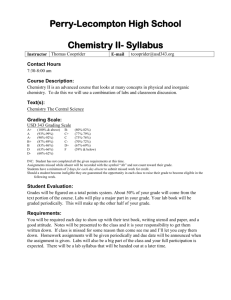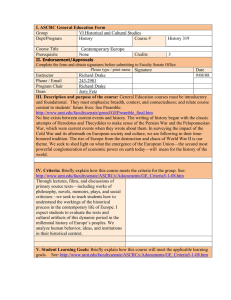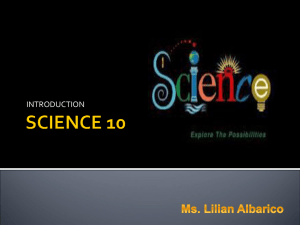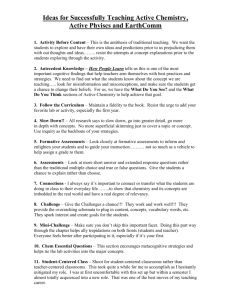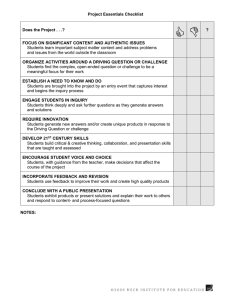I. ASCRC General Education Form Group Group XI Natural Science Dept/Program
advertisement
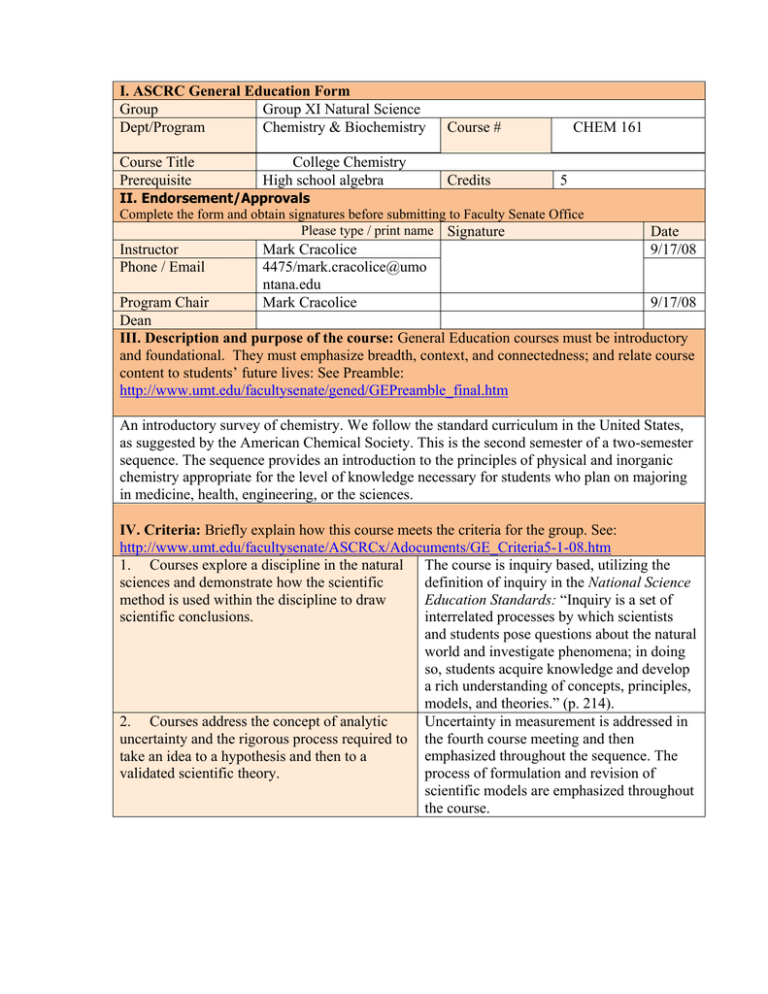
I. ASCRC General Education Form Group Group XI Natural Science Dept/Program Chemistry & Biochemistry Course # Course Title Prerequisite Credits College Chemistry High school algebra CHEM 161 5 II. Endorsement/Approvals Complete the form and obtain signatures before submitting to Faculty Senate Office Please type / print name Signature Instructor Phone / Email Mark Cracolice 4475/mark.cracolice@umo ntana.edu Mark Cracolice Date 9/17/08 Program Chair 9/17/08 Dean III. Description and purpose of the course: General Education courses must be introductory and foundational. They must emphasize breadth, context, and connectedness; and relate course content to students’ future lives: See Preamble: http://www.umt.edu/facultysenate/gened/GEPreamble_final.htm An introductory survey of chemistry. We follow the standard curriculum in the United States, as suggested by the American Chemical Society. This is the second semester of a two-semester sequence. The sequence provides an introduction to the principles of physical and inorganic chemistry appropriate for the level of knowledge necessary for students who plan on majoring in medicine, health, engineering, or the sciences. IV. Criteria: Briefly explain how this course meets the criteria for the group. See: http://www.umt.edu/facultysenate/ASCRCx/Adocuments/GE_Criteria5-1-08.htm 1. Courses explore a discipline in the natural The course is inquiry based, utilizing the definition of inquiry in the National Science sciences and demonstrate how the scientific Education Standards: “Inquiry is a set of method is used within the discipline to draw scientific conclusions. interrelated processes by which scientists and students pose questions about the natural world and investigate phenomena; in doing so, students acquire knowledge and develop a rich understanding of concepts, principles, models, and theories.” (p. 214). 2. Courses address the concept of analytic Uncertainty in measurement is addressed in uncertainty and the rigorous process required to the fourth course meeting and then emphasized throughout the sequence. The take an idea to a hypothesis and then to a validated scientific theory. process of formulation and revision of scientific models are emphasized throughout the course. The laboratory portion of the course is also inquiry-based. One form of evidence of this is that the laboratory manual we use is titled Inquiries Into Chemistry. Students perform both guided inqiry and open inquiry experiments. V. Student Learning Goals: Briefly explain how this course will meet the applicable learning goals. See: http://www.umt.edu/facultysenate/ASCRCx/Adocuments/GE_Criteria5-1-08.htm 1. understand the general principles The sequence provides an introduction to associated with the discipline(s) studied the principles of physical and inorganic chemistry appropriate for the level of knowledge necessary for students who plan on majoring in medicine, health, engineering, or the sciences. 2. understand the methodology and activities The laboratory portion of the course is also scientists use to gather, validate and interpret inquiry-based. One form of evidence of this data related to natural processes is that the laboratory manual we use is titled Inquiries Into Chemistry. Students perform both guided inqiry and open inquiry experiments. Chemists often use skills such as 3. detect patterns, draw conclusions, develop conjectures and hypotheses, and test them by mathematical pattern recognition, the appropriate means and experiments development and manipulation of mental models of particulate-level phenomena, and proportional, probabilistic, combinatorial, and correlational thinking. These thinking skills are emphasized throughout the course. 4. understand how scientific laws and theories The course is inquiry based, utilizing the are verified by quantitative measurement, definition of inquiry in the National Science scientific observation, and logical/critical Education Standards: “Inquiry is a set of reasoning interrelated processes by which scientists and students pose questions about the natural world and investigate phenomena; in doing so, students acquire knowledge and develop a rich understanding of concepts, principles, models, and theories.” (p. 214). 5. understand the means by which analytic Uncertainty in measurement is addressed in uncertainty is quantified and expressed in the the fourth course meeting and then natural sciences emphasized throughout the sequence. VII. Syllabus: Paste syllabus below or attach and send digital copy with form. ⇓ The syllabus should clearly describe how the above criteria are satisfied. For assistance on syllabus preparation see: http://teaching.berkeley.edu/bgd/syllabus.html 3. Lab courses engage students in inquirybased learning activities where they formulate a hypothesis, design an experiment to test the hypothesis, and collect, interpret, and present the data to support their conclusions. Attached. *Please note: As an instructor of a general education course, you will be expected to provide sample assessment items and corresponding responses to the Assessment Advisory Committee.
